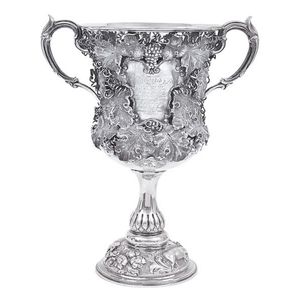Geelong Wine Growers Cup & Kitz Silver Collar
You must be a subscriber, and be logged in to view price and dealer details.
Subscribe Now to view actual auction price for this item
When you subscribe, you have the option of setting the currency in which to display prices to $Au, $US, $NZ or Stg.
- Sterling Silver - Sterling silver is a mixture of 92.5% pure silver and 7.5% of another metal, usually copper. Fine silver is 99.9% pure silver, and is relatively soft and the addition of the very small amount of copper gives the metal enough strength and hardness to be worked into jewellery, decorative and household objects.
- Cartouche - An ornamental panel in the form of of a shield, oval or rectangular scroll with curling edges. It may be carved into the back of a chair or the top of a sideboard, or present on a piece of silver or jewellery, and contain the initials of the original owner, heraldic symbols, or some other inscription, such as the details of a presentation.
In ceramics the term defines the central area of a vase or similar with a decorative border in one of the shapes above, into which a decorative scene or figures have been painted. - Embossed / Repousse - Embossing, also known as repousse, is the technique of decorating metal with raised designs, by pressing or beating out the design from the reverse side of the object.It is the opposite of chasing, where the decoration is applied from the front. An embossed or repoussed object may have chasing applied to finish off the design.
- Attributed - A cataloguing term where the item in the opinion of the cataloguers, is a of the period of the artist, craftsman or designer, and which probably in whole or part is the work of that person.
- Circa - A Latin term meaning 'about', often used in the antique trade to give an approximate date for the piece, usually considered to be five years on either side of the circa year. Thus, circa 1900 means the piece was made about 1900, probably between 1895 and 1905. The expression is sometimes abbreviated to c.1900.
- Chasing - The method of decorating gold and silver objects using a punch and hammer so that the design appears in relief. Flat or surface chasing is done from the front giving the item definition, but not cutting into the metal.
Chasing is the opposite technique to repousse, but an object that has repousse work, may then have chasing applied to create a finished piece.
This item has been included into following indexes:
- cups, presentation and trophies - silver items 428
- Hanau, Germany - precious objects 74
- Houle , Daniel and Charles Houle (London) - silver, maker or retailer 40
-
silver, country of manufacture
- Australian, unmarked 3
- German 583
Visually similar items

A Chinese silver dragon handled goblet, early 19th century, marked Sun Shinh, Canton. Stamped SS to base, approximately 30 cm high, 26 cm diameter. 871 gms silver

English hallmarked sterling silver Victorian jug with allover floral etched detail. Birmingham, 1863, maker Henry Hyde Aston, height 12.5 cm, weight 179g

A George III sterling silver twin-handled cup and cover, London 1744, by William Grundy, with presentation inscription 'The Gift of John Kityermaster Esq. Deputy of Billingsgate, Ward to the Company of Fellowship Porters 1793', weight 1.91kg. 41 cm high

The 1873 Sunbury Cup Australian silver trophy for greyhound coursing, attributed to Edward Fischer (1828-1911), the ovoid vessel in the Etruscan manner, rising to a waisted neck, flanked by foliate angular scroll handles chased and engraved with scenes aft
